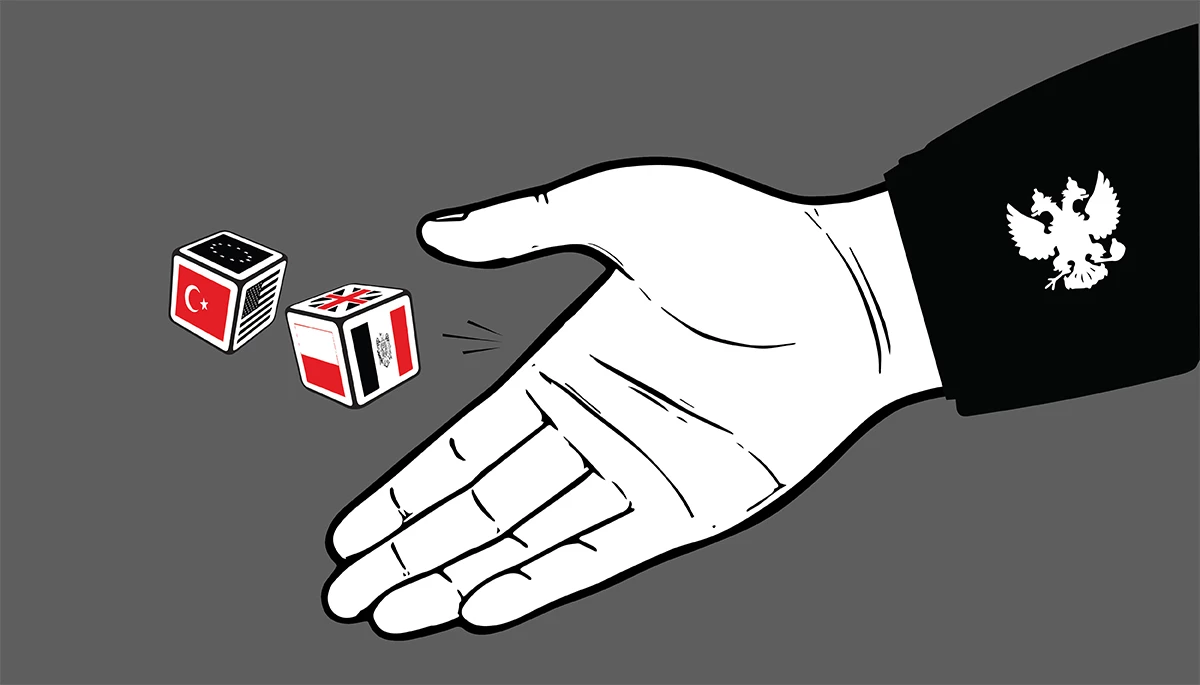Українською читайте тут.
For the past three weeks, Russian propaganda has been spreading false information and manipulating the truth about the international visits of Volodymyr Zelenskyy and Joseph Biden, as well as the plans of Poland and Moldova for Ukraine. Furthermore, they have been exploiting the causes and consequences of the earthquakes in Turkey and Syria to further their own interests.
Since February 24, Detector Media has been monitoring the Ukrainian segment of social media and documenting the chronicle of Russian disinformation around Russia's military offensive in Ukraine on a daily basis. Recently, we have also started doing weekly reviews. Between February 9 and February 28, 2023, Detector Media analysts recorded more than 120 Russian disinformation attacks. During this time, propagandists spread their own, i.e., Russian, vision of the causes and consequences of Volodymyr Zelenskyy's visit to the UK and the EU, Joe Biden's visit to Ukraine, and also attempted to dehumanize Ukrainians in the context of earthquakes in Turkey.
You can find the reviews of Russian disinformation from previous weeks here: September 26 - October 2; October 3-9, October 10-17, October 17-24, October 24-31, October 31 - November 6, November 7-14, November 14-21, November 21-28, November 28 - December 4, December 5-12, December 12-19, December 19-26, January 2-9, January 10-16, January 17-23, January 24-31, February 1-8, a summary for ten months, and a review of the most ridiculous fakes of the year of the full-scale invasion.
In February, a devastating earthquake hit southeastern Turkey and Syria, resulting in tens of thousands of fatalities. Taking advantage of the tragedy, Russian propaganda spread a message on social media and pro-Kremlin Telegram channels alleging that Europe had deliberately caused the earthquake as a punishment for Turkey's stance towards Russia. They claimed that Europe had planned the disaster and utilized "tectonic weapons" to carry it out. However, it's important to note that the existence of such weapons is an unproven conspiracy theory.
The Russian propagandists went even further by claiming that President Zelenskyy of Ukraine had insensitively asked earthquake-stricken Turks for military equipment instead of offering condolences and support. They alleged that Zelenskyy had displayed "hypocrisy" by demanding more weapons. To back up their claims, they circulated a fake screenshot of a tweet purportedly sent from Zelenskyy's account, stating that "Turkey will overcome the tragedy, and the supply of weapons will not stop." However, this is all false propaganda. In reality, Zelenskyy not only offered his condolences to the earthquake victims but also issued a decree to provide humanitarian aid to Turkey. Furthermore, Ukraine has dispatched eighty rescuers and special equipment from the State Emergency Service to assist with relief efforts. This type of disinformation is a classic example of Russian propaganda tactics that aim to dehumanize the enemy by portraying Europe as "criminal" and Ukraine as "unsympathetic."
The Russian propagandists also made the false claim that the Azov Brigade's Telegram channel had published racist and insensitive posts, celebrating the deaths of children and belittling the victims of the earthquake in Turkey. They used this as an example of the supposed "Nazism" that Russia is supposedly fighting against in Ukraine. However, the truth is that these messages were actually posted on the AZOV Ukraine Supporters Telegram channel, which has no affiliation with the Azov Brigade. The channel's creators frequently post their own conspiracy theories and repost content from other channels. For instance, they share unverified English-language posts claiming that there are "Ukrainian Nazis" and that the United States artificially caused the earthquake in Turkey.
As news of Ukrainian President Volodymyr Zelenskyy's visit to the UK, France, and Belgium spread, anonymous Telegram channels disseminated various pieces of disinformation that Russia used to push its own narrative to the audience. Some of these false claims include:
- Zelenskyy's visit is a ploy to divert attention from the situation in Bakhmut.
- The purpose of Zelenskyy's European trip is to cover up the corruption scandal in Ukraine.
- Zelenskyy is no longer a "bunker ruler" now that the myth that Putin wants to kill him has been debunked.
- In 2023, Zelenskyy will make more trips to Europe due to the upcoming elections.
- Zelenskyy's photo with a British tank is the most significant thing he will achieve on this trip.
- A visit to the European Parliament will yield no results.
- Some of the messages even contained personal attacks against Volodymyr Zelenskyy.
In reality, Volodymyr Zelenskyy's second foreign visit since the start of the full-scale invasion was a significant one. The Ukrainian president received an audience with the British monarch, and the United Kingdom imposed new sanctions on Russia. Additionally, the French President awarded Zelenskyy the Legion of Honor, France's highest civilian award for merit.
However, anonymous Telegram channels spread false reports that British newspapers, the Evening Standard and The Times, had published caricatures of Zelenskyy on their front pages following his visit to London. These claims are untrue, and the fake covers were circulated with the intent to undermine the success of international cooperation and support for Ukraine.
In February, many Russian fake news stories focused on Moldova. Propagandists claimed that the then Prime Minister of Moldova, Natalia Gavrilița, confirmed in an interview with the Financial Times that the Ukrainian army was reselling weapons. Allegedly, Ukraine is engaging in fraud and smuggling by "throwing weapons around." However, the interview only mentioned the increased risks of arms smuggling due to the ongoing war against Ukraine without providing any concrete evidence or specific accusations.
Additionally, Telegram channels circulated false reports that Natalia Gavrilița had admitted to the smuggling of Ukrainian donor organs into Moldova, including the organs of wounded Ukrainian soldiers. Allegedly, Moldova has become a black market for these organs. However, these claims were fabricated by propagandists, and Natalia Gavrilița did not make any such statement.
Moreover, Russian agitprop claimed that Romania and Moldova were constructing a road for deploying NATO forces to Odesa, citing statements from the Romanian Minister of Transport and Infrastructure. However, following a meeting between the Moldovan and Romanian ministers of infrastructure, the Romanian mission reported that the two countries were considering extending the Romanian-Moldovan highway to Odesa. Nevertheless, there is no evidence to suggest that this highway is intended to "redeploy NATO forces to Ukraine," nor is it being built as part of military aid to Ukraine.
The Russian propagandists also spread their usual Polish-Ukrainian narratives, alleging that Poland was building up its military power not to defend itself against Russia but to take over Ukraine and suppress uprisings in the "returned" regions. They used the appeal to authority fallacy, citing the Polish edition of Niezależny Dziennik Polityczny, which regularly publishes false information, as a source to support their claims. Russian outlets shared the site's "personal opinions" as if it were a journalistic investigation without any further confirmation.
Additionally, the agitprop claimed that military exercises in Poland were aimed at convincing Polish soldiers to attack Moscow and Kaliningrad. They suggested that Poland was not only preparing to conquer western Ukraine but would also attempt to seize parts of Belarus or Russia. They further claimed that Polish President Andrzej Duda was planning to restore the territories of the Polish-Lithuanian Commonwealth and would do everything in his power to achieve this goal. However, all of these claims are unfounded propaganda based on Russia's own imperial ambitions.
Moreover, the propagandists spread false reports that the Poles were distancing themselves from the war in Ukraine. As “proof”, they shared photoshopped images of a billboard with the words "To nie jest nasza wojna" ("This is not our war") in Polish, against the backdrop of Ukrainian and Russian flags. However, there was no such advertisement in reality, and these images were fabricated to further the propaganda campaign.
Moreover, the propagandists asserted that the opinions of many Poles toward Ukrainians had worsened. Supposedly, the majority of Ukrainians speak Russian and display extravagant vehicles, characteristic of the "Russian world." Consequently, Poles are purportedly hostile toward specific groups of Ukrainian refugees. It is essential to note that the findings of sociological polls diverge from the agitprop's version: in January 2023, 80% of surveyed Poles expressed favorable views of refugees from Ukraine. A mere 8% held negative opinions of Ukrainians, and 12% remained neutral. The Russian propaganda machine consistently skews public sentiment to fabricate the illusion that Ukrainians lack support and will soon be left do deal with Russia on its own.
Propagandists also focused on the potential participation of Russian and Belarusian athletes in the 2024 Olympic Games in Paris in February. Forty countries, including Ukraine, opposed this notion. As a result, propagandists began disseminating messages equating the exclusion of Russian and Belarusian athletes from the Olympics to racism. They claimed that athletes were being discriminated against since they were barred from international competitions, even under a neutral flag. Furthermore, propagandists argued that governments were meddling in sports rather than addressing matters of national significance.
On February 28, 2022, the Executive Committee of the International Olympic Committee did indeed recommend that international sports federations and sports event organizers "not invite or allow the participation of Russian and Belarusian athletes and officials in international competitions." This decision is connected to Russia's full-scale invasion of Ukraine and cannot be qualified as racism in any way, as it is not based on racial grounds. The propagandists are using equivocation to portray Russians and Belarusians as victims.
The propagandists also circulated an allegedly new cover of the German comedy magazine Eulenspiegel, which depicts representatives of the LGBTI community and Ukrainians holding Olympic rings with the inscription: "Tug of war at the Olympics!". This cover is fake, and its purpose is to show that Ukraine is trying to get more attention than it deserves.
Amid the news of US President Joe Biden's arrival in Ukraine, anonymous Telegram channels broadcasting pro-Russian rhetoric also posted a lot of disinformation:
- Biden arrived to announce he was "abandoning" Ukraine;
- The air raid was initiated for a "photo op" to frighten President Biden;
- Biden's visit served only as self-promotion for both Biden and Zelenskyy;
- Biden intended to "punish" the Presidential Office;
- Biden's mere presence was "destroying churches."
Russian propagandists also attempted to discredit Biden's visit, alleging that during his speech in Poland, the American president supposedly promised Ukraine "difficult times." The speech in Warsaw was purportedly intended to resemble a victory speech, but it allegedly only documented the interim outcomes of the "conflict" between the West and Russia, assigning Ukraine the role of a pawn. By doing so, Russian propaganda perpetuates narratives surrounding Ukraine's "external governance" and the "Russia-West conflict on Ukrainian soil."
Propagandists also claimed that before Joe Biden's visit, Kyiv residents were allegedly given a handbook outlining proper interaction with Americans, including dos and don'ts. Images of the "handout" were circulated as evidence. These claims are false, not least because the Ukrainian administration did not inform about the visit of the US president in advance.



